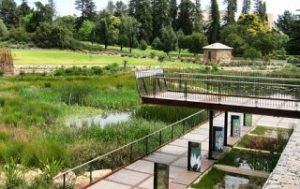 In order to enhance visual, social, cultural and ecological experiences in the urban landscape, we must create and maintain urban spaces that both protect environmental values and provide quality recreation and social opportunities.
In order to enhance visual, social, cultural and ecological experiences in the urban landscape, we must create and maintain urban spaces that both protect environmental values and provide quality recreation and social opportunities.
Since 2005, our Water by Design initiative has been working with individuals and organisations to identify and fill knowledge gaps, and facilitate the uptake of improved practice in sustainable water management.
We work together to encourage innovative practice and build regionally consistent approaches. By facilitating information exchange, networking, and constructive debate, practitioners are motivated to deliver high quality urban environments.
We identify and fill knowledge gaps with evidence-based resources and tools, promoting smarter policy that enables innovation.
We facilitate practice uptake by delivering capacity building services and products including training, guidelines and technical resources for practitioners in industry and local government.
Healthy Waterways is focused on four main priority areas:
Total Water Cycle Management: By building relationships between organisations, teams and people we are able to harmonise activities and investments in the water cycle, resulting in improved economic, social and environmental outcomes. We support government, industry and community to achieve these integrated outcomes by developing guidance, participating in and influencing reform processes and supporting proactive water cycle planning.
Water Sensitive Urban Design (WSUD): Urban development using conventional approaches can have a negative impact on the natural water cycle. WSUD seeks to minimise this impact by integrating developments with a site’s natural features and promoting the integration of stormwater, water supply and sewage management.
Erosion and Sediment Control: Erosion and sediment from construction sites in urban areas presents one of the most serious threats to the health of South East Queensland waterways. Rapid population growth leading to expanding development requires regulation and access to cost-effective management practices.
Recovering Waterways: Incorporating total water cycle practices that encourage rehabilitation and protection of urban waterways while creating liveable places of value to the community.
